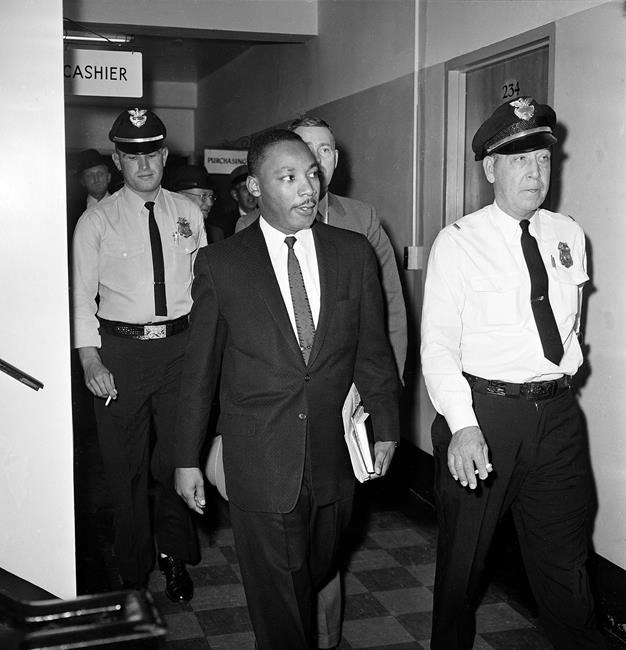
FILE - In this Oct. 25, 1960 file photo, Dr. Martin Luther King Jr. leaves court after being given a four-month sentence in Decatur, Ga., for taking part in a lunch counter sit-in at Rich's department store. Following the publication of "An Appeal for Human Rights" on March 9, 1960, students at Atlanta's historically black colleges waged a nonviolent campaign of boycotts and sit-ins protesting segregation at restaurants, theaters, parks and government buildings. (AP Photo, File)
Republished May 05, 2020 - 5:41 AM
Original Publication Date May 03, 2020 - 10:06 PM
DECATUR, Ga. - EDITOR’S NOTE — The year of 1960 was pivotal for civil rights in America. Segregationist politicians insisted on upholding racist laws and policies that denied black people equal access to many aspects of public life. Legal challenges moved slowly. That year’s presidential candidates vied for the support of southern white voters amid the simmering frustrations of black people.
This dynamic changed after college students risked arrest by openly disobeying the race laws. Inspired by the lunch counter sit-ins in Greensboro, North Carolina, and guided by the Rev. Martin Luther King Jr.’s philosophy of nonviolent civil disobedience, Atlanta’s students led sit-ins and boycotts that cut deeply into the profits of white businesses.
King joined them in October 1960, raising pressure that brought Atlanta’s leaders to negotiate an end to the campaign in exchange for desegregating public places. Everyone was freed but King, who faced probation after pleading guilty to a false charge of driving without a license months earlier, even though he carried a valid Alabama license. Judge J. Oscar Mitchell sentenced him to four months of hard labour.
Georgia’s leaders had sought to silence King, but it backfired when John F. Kennedy and his brother Robert got involved, just before Election Day. Mitchell agreed to free King on bond, prompting blacks to vote Democrat in an effort to end Jim Crow laws in the South.
Sixty years later, The Associated Press is making available some of its coverage of these events, including photographs from the AP’s archive and this article on King’s sentencing in Decatur, Georgia, that appeared under the headline “Negro Integration Leader Sentenced to Four Months.”
___
Oct. 25, 1960
A Negro leader who says integration is unstoppable was ordered Tuesday to serve four months in a Georgia public works camp on a minor traffic violation.
Dr. Martin Luther King Jr., holder of degrees from at least five colleges, may spend the time on a road gang if an appeal is denied.
King was among 79 people arrested Oct. 19 during mass picketing and sit-in demonstrations protesting against segregated eating places at Atlanta department and variety stores.
County officials in this suburban area of Atlanta called King's part in the sit-ins a violation of his 12-month probationary sentence given him Sept. 23 on a charge of driving without a license.
Judge Oscar Mitchell of DeKalb County criminal court heard two hours of argument in a courtroom packed with Negro and white spectators. The court denied bond for the Negro minister pending appeal, and set a hearing on the appeal motion for 10 a.m. Wednesday.
King, leader of the Montgomery, Ala., bus boycott, has been active in Southern sit-in demonstrations by Negro students. He has urged students to “fill up the jails of the South to arouse the dozing conscience of the nation.”
All of the recent Atlanta demonstrators except King were released on bond. King was held at the request of Dekalb County officials for violating the state's recently-enacted trespass law, aimed at curbing lunch counter sit-ins, while on probation in the traffic case.
More than 200 white persons and 100 Negroes crowded into the small courtroom. In the confusion, the president of the Atlanta chapter of the National Association for the Advancement of Colored People was arrested and charged with interfering with the duties of a deputy sheriff.
King pleaded guilty in September to the traffic violation and paid a $25 fine. He said Tuesday he was not aware that he was on probation in the traffic case. But Mitchell interrupted his testimony by declaring the Negro signed the guilty plea and that an attorney had explained to King at the time that the 12-month sentence could be invoked in event of further law violations.
D.L. Hollowell, heading a staff of five Negro attorneys for King, contented the probationary sentence was null because state law limited such a sentence to six months. Hollowell also argued that the anti-trespass law, allegedly violated by King, is unconstitutional.
Jack Smith, Dekalb prosecutor, declared that King had pleaded guilty to the traffic charge and violated the law again in the Atlanta sit-ins. “By doing so," Smith said, “he violated the terms of his probationary sentence.”
The four-month term was called shocking by Roy Wilkins, executive secretary of the NAACP. Wilkins, a spectator at Tuesday's hearing, commented:
"Its intent will be felt all over the country as a persecution rather than a satisfaction of a violation of a traffic rule.
“This incident and the picketing and the protest and other demonstrations are merely evidence of a problem to which the state of Georgia will have to address itself whether it wants to or not.”
__
The Associated Press Corporate Archives contributed to this report.
News from © The Associated Press, 2020